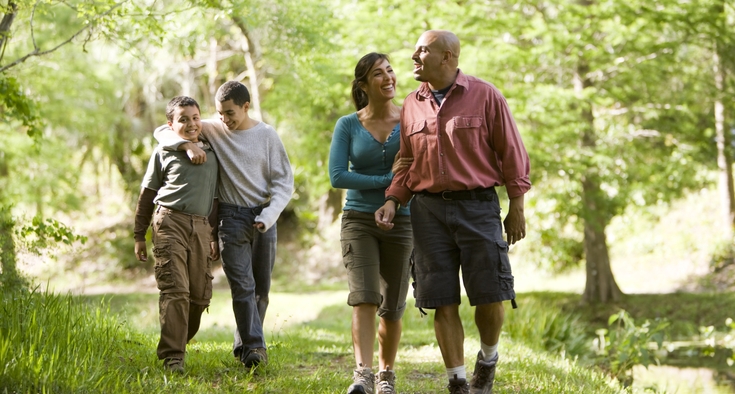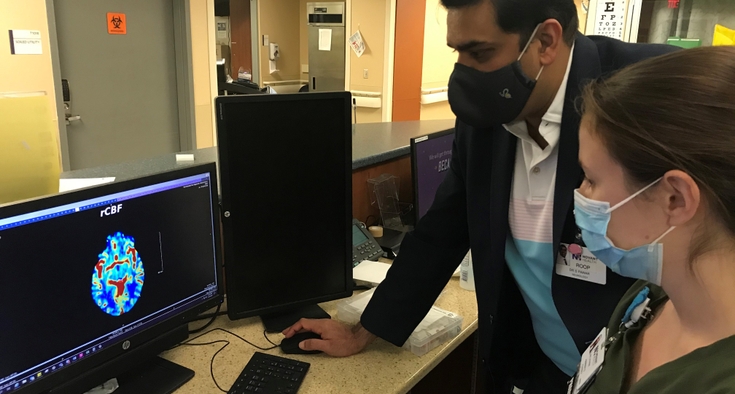Oscar Salas Alaya has endured an ordeal – an ongoing one – many of us cannot fathom.
He and his wife, Laura Martinez Paz, live in Las Mesas de Don Luis, Mexico. They and their four children – ages 15, 12, 10 and 4 – are six of just 200 residents of that remote town.
Oscar, who speaks only Spanish, has been traveling to Canada every year since 2004 as part of a guest-worker program. He works in the broccoli fields from June through October to support his family.
On his way back to Mexico last November, he stopped to visit a friend in North Carolina. While there, Oscar – who already had a pacemaker – had a severe stroke and was airlifted to Novant Health Forsyth Medical Center in Winston-Salem.
This is a time you’d need family by your side. But that seemed impossible. There were oceans of red tape, limited resources, a language barrier, all further complicated by the endless snarls COVID has brought to everything.

“I received an urgent call from my husband’s friend telling me that he was very sick and needed surgery,” Laura told a Novant Health bilingual interpreter. “An interpreter explained that they would send me some documentation so I could get a (humanitarian) visa to come to the United States.” Oscar’s friends from North Carolina gave the ICU staff the necessary information to get the ball rolling.
Becky Allman, cultural ambassador supervisor, and her team of bilingual cultural ambassadors got right to work. But it wasn’t easy. There was red tape, and lots of it. And Laura doesn’t own a computer or have an email address.
The team, including nurse Courtney Nowlin, had to devise another way to get a letter, one of the documents required to request a visa, to her. “Courtney ended up giving the letter to the friend who in turn sent it via WhatsApp to Laura, who then took it to a consulate in Mexico,” Allman recalled.
“I never imagined it could get approved quickly,” Allman said. “Everything with immigration is behind because of COVID. But this was meant to be.”
Cultural ambassadors are trained to successfully bridge the cultural and linguistic barriers that non-English speaking patients may encounter when interacting with the health care system.
The journey begins
Laura traveled to San Luis Potosí – the closest big city – to get a passport. Then, she traveled 600 miles by car to San Antonio, Texas, where she has a brother who bought her a plane ticket to North Carolina.
Her presence alone made a difference for Oscar. They were more than 1,800 miles from home. But they were together. “He just kept looking at her,” said cultural ambassador Taylor Dixon. “She would reassure him and calm him down and say, ‘I'm still here. I'm still here.’”
Another snag: The visa was valid for less than a week.
A doctor and case managers provided the required documentation to request a visa extension, verifying that Oscar has a long recovery ahead, needs another surgery in six months and could benefit from having his wife at his side for the duration.
Race to beat the clock
Allman and team are accustomed to the humanitarian visa application process, but Laura was here for just five days. Allman had never heard of such a short-term visa. Laura had just gotten to America, it seemed, and it was almost time for her to return home.
Stephanie Osorio, one of the ICU nurses who treated Oscar, volunteered to assist Laura in the visa extension application process, but she was running into barriers and running out of time. Taylor Dixon – the cultural ambassador and the first person to meet Oscar when he came to the hospital Nov. 29 – helped Laura complete the paperwork to apply for an extension. She also helped Laura establish an email address. “Taylor is very tech-savvy,” Allman said. “She spent hours online helping get everything sorted out. She was crucial in this effort.”
Allman and the other cultural ambassadors began an ordeal of their own in trying to help get the visa extended. Immigration rules and regulations keep changing because of COVID. Government websites contain outdated information. Staff shortages mean no one’s answering phones.
The clock was ticking. But this team wasn’t giving up.
They ran into one roadblock after another. At one point, they were told they weren’t going to be able to extend the visa because the immigration form is for people who arrived in the United States by air or sea – not by car, as Laura had when she came to San Antonio.
At another point, desperate to speak to a real person as she navigated a maddening immigration system phone tree, Allman said she requested “representative” so many times that an auto-reply threatened to disconnect her. “I didn't realize I was this persistent,” Allman said.
Ailen Arreza contributed to this story.












